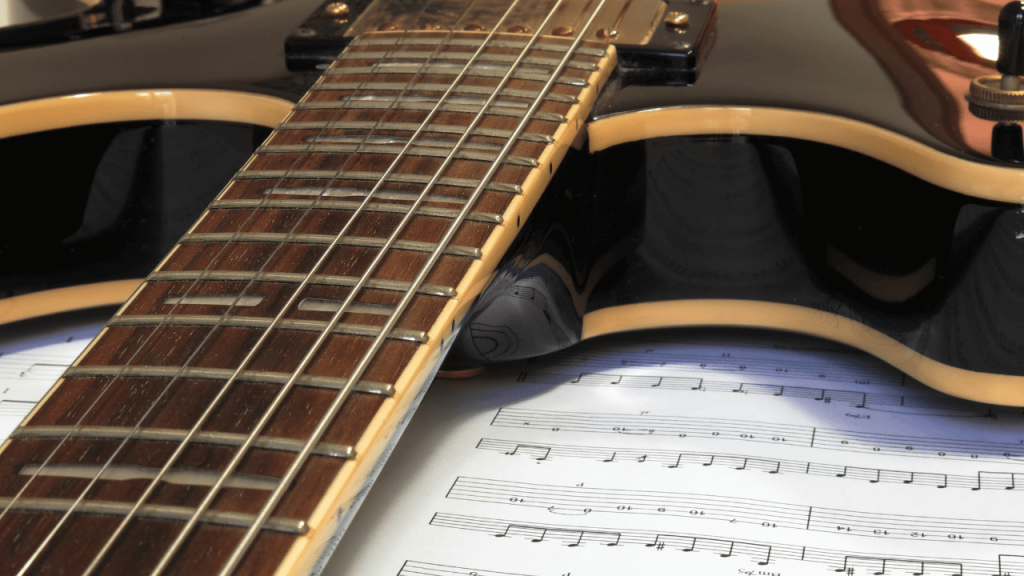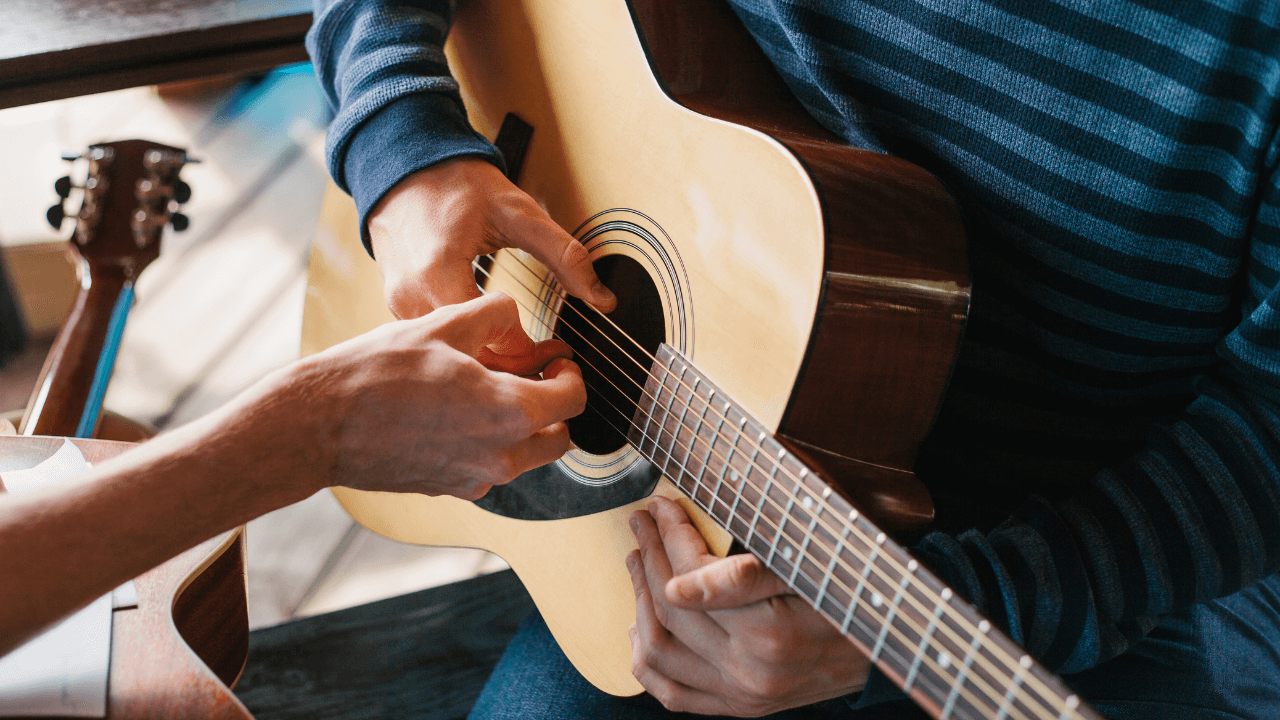Learning to play the guitar is an exciting journey that opens up a world of music and self-expression. However, for beginners, it’s natural to wonder just how hard is it to learn guitar.
In this blog post, we’ll delve into the basics of guitar learning and provide valuable insights to help you understand what to expect as you embark on your guitar-playing adventure.
How hard is it to learn guitar?
How hard is it to learn guitar? Well, it really depends on how you look at it. Let’s be real here – picking up the guitar and becoming a rockstar overnight is not gonna happen. Learning any instrument takes time and effort, and the guitar is no exception.
When you first start out, you might feel a bit overwhelmed. Your fingers might feel like they have a mind of their own, and those strings can be downright unfriendly at times. But hey, don’t let that discourage you!
With a little perseverance and a few tricks up your sleeve, you’ll start making progress before you know it.
One of the challenges beginners face is getting used to holding and strumming the guitar. It can feel awkward at first, like you’re juggling a porcupine.
But trust me, with some practice, your hands will find their groove and it’ll become second nature.
Reading music? Yeah, that can be a bit tricky too. Those squiggly lines and dots on sheet music might look like an alien language at first. But fear not!
You don’t have to be a musical genius to play the guitar. Many guitarists rely on tabs, which are like cheat codes for playing songs. Tabs show you exactly where to put your fingers on the frets, making it easier to learn your favorite tunes.
Let’s not forget about the dreaded finger soreness. When you start pressing down those strings, your fingertips might protest a bit. But guess what?
That’s actually a good sign! It means you’re building up calluses, which are like tiny armor for your fingertips. Once those calluses develop, you’ll be able to play for hours without feeling a thing.
Now, don’t get me wrong – learning the guitar does require dedication and practice. It’s not gonna happen overnight. But here’s the thing: it’s also a whole lot of fun! As you start getting the hang of it, playing your favorite songs and jamming with friends becomes incredibly rewarding.
So, is learning the guitar hard? Well, it’s not a walk in the park, but it’s definitely doable. Take it one step at a time, be patient with yourself, and enjoy the process.
Remember, every guitar player started as a beginner. Keep strumming and you’ll be rocking out in no time!
Obstacles you will encounter while learning to play guitar
Learning the guitar, like any musical instrument, comes with its fair share of obstacles. Here are some common challenges that beginners may encounter along their guitar-learning journey:
Finger Dexterity and Coordination: One of the initial hurdles is developing finger dexterity and coordination. It takes time for your fingers to become accustomed to pressing down the strings and forming chords accurately. Initially, you may struggle with finger placement and transitioning between chords smoothly.
Strumming and Picking Techniques: Mastering strumming and picking techniques can be challenging. Coordinating your strumming hand with the fretting hand while maintaining a steady rhythm requires practice and patience.
Achieving clean and consistent strumming patterns or precise picking can take time to refine.
Reading Music Notation: While guitar tablature (tabs) provides a more accessible form of notation, learning to read standard music notation can be a hurdle for some. Understanding musical symbols, rhythms, and note durations can be initially confusing, but it becomes easier with practice.
Music Theory: Learning basic music theory concepts, such as scales, chords, and keys, is essential for understanding the structure and harmony behind songs. For some beginners, grasping these concepts may require additional effort and study.
Time Commitment and Patience: Learning the guitar is not an overnight process. It requires consistent practice and dedication over an extended period. Some beginners may find it challenging to allocate regular practice time amidst their daily commitments, which can slow down progress.
Frustration and Plateaus: It’s common to experience frustration and plateaus during the learning process. Progress may seem slow at times, and you may encounter difficulties in mastering certain techniques or songs.
It’s important to persevere through these moments and maintain a positive mindset.
Developing Ear Training: Developing a good ear for music, including recognizing melodies, chords, and intervals, takes time and practice.
Initially, it may be challenging to identify the notes by ear or play songs by ear without relying on sheet music or tutorials.
Overcoming Performance Anxiety: Many aspiring guitarists face performance anxiety, especially when playing in front of others or in public.
Building confidence and overcoming stage fright is an ongoing process that requires exposure and experience.
Getting Familiar with the Instrument: At first, the guitar may feel unfamiliar and even uncomfortable in your hands. The frets, strings, and the size of the instrument can be intimidating.
However, with practice and patience, you will gradually develop muscle memory, making it easier to navigate the guitar’s fretboard.
Developing Finger Strength and Calluses: Pressing the strings against the fretboard requires finger strength and can cause initial discomfort or even slight pain. This is where patience is crucial.
Regular practice will strengthen your fingers and help you develop calluses, which will make playing more comfortable in the long run.
Where to start when learning to play guitar

So, you’re ready to embark on your guitar-playing journey? That’s awesome! Now, let’s talk about where to start.
First things first, get yourself a guitar. You can choose between an acoustic or an electric guitar, depending on your preference and the type of music you want to play.
If you’re not sure which one to go for, acoustic guitars are great for beginners because they’re affordable, don’t require an amp, and offer a classic sound.
Once you have your guitar in hand, it’s time to familiarize yourself with its parts. Learn about the neck, the frets, the strings, and how to tune your guitar. Proper tuning is essential to make sure you’re playing in the right key and that your chords and notes sound good.
Next, let’s dive into the basics. Start by learning some fundamental chords like the open chords (G, C, D, E, A, and F) and some simple strumming patterns.
These chords will be the building blocks for countless songs and will get you strumming along in no time. Practice transitioning between chords smoothly and work on your strumming technique to develop a good sense of rhythm.
Now, let’s talk about resources. There are plenty of online tutorials, videos, and apps that can guide you through the learning process.
Websites like JustinGuitar and YouTube channels dedicated to guitar lessons offer a wealth of free lessons for beginners. Find a teacher or a learning method that resonates with you and follow along at your own pace.
Don’t forget to practice regularly. Consistency is key when learning the guitar. Even if you can only spare 15 minutes a day, make it a habit to pick up your guitar and practice.
It’s better to have short, focused practice sessions than sporadic long ones. As you progress, challenge yourself with new chords, scales, and songs to keep expanding your skills.
Playing with others can also enhance your learning experience. Join a local guitar circle, find fellow musicians, or even participate in online communities where you can share your progress, get feedback, and jam with like-minded individuals.
Playing with others not only boosts your motivation but also helps you develop your ear and adapt to different playing styles.
Resources and tips to aid your guitar learning journey

Here are some resources and tips to help you along your guitar-learning journey:
Online Lessons and Tutorials: Take advantage of the wealth of online resources available. Websites like JustinGuitar, Guitar Tricks, and Fender Play offer structured lessons for beginners, intermediate players, and beyond.
YouTube is also a treasure trove of guitar tutorials, covering a wide range of styles and techniques. Find instructors or channels that resonate with your learning style and explore their content.
Guitar Apps: There are several mobile apps designed to assist with guitar learning. Apps like Yousician, Ultimate Guitar, and GuitarTuna provide interactive lessons, chord libraries, tabs, and tools for tuning your guitar. They can be convenient for on-the-go learning and practicing.
Guitar Books and Songbooks: Don’t underestimate the power of good old-fashioned books. Many reputable guitar instruction books cater to beginners and provide step-by-step guidance.
Additionally, songbooks featuring your favorite artists and bands can be an excellent source of motivation and help you practice playing songs you love.
Online Guitar Communities: Joining online guitar communities and forums can connect you with fellow learners and experienced guitarists. Platforms like Reddit’s r/Guitar and Guitar World’s forums allow you to ask questions, seek advice, and engage in discussions related to guitar playing. It’s a supportive space to share your progress, gain insights, and find inspiration.
Seek a Local Guitar Teacher: If you prefer a more personalized and hands-on approach, consider finding a local guitar teacher or instructor.
They can provide customized guidance, identify areas for improvement, and offer valuable feedback to help you progress faster.
Look for local music schools, private instructors, or even community centers that offer guitar lessons.
Practice Consistently: Make a commitment to practice regularly. Consistency is key when it comes to improving your skills. Aim for daily practice, even if it’s just for a short duration.
Set specific goals and break down your practice sessions into manageable chunks, focusing on technique, chords, scales, or songs.
Remember, regular practice builds muscle memory and enhances your overall playing ability.
Learn Songs You Love: Playing songs you enjoy can be incredibly motivating. Find tabs or chord charts for your favorite songs and start learning them.
Start with simpler songs and gradually challenge yourself with more complex arrangements. Playing songs you love keeps the learning process engaging and enjoyable.
Break Down Songs into Manageable Parts: Learning songs can be exciting and motivating, but they can also seem overwhelming at first. Break down songs into smaller sections or chords and practice them individually.
Once you’re comfortable with the individual parts, gradually piece them together until you can play the entire song.
Explore Different Styles and Techniques: Don’t limit yourself to one style of music. Experiment with various genres and techniques to expand your musical repertoire.
Explore blues, rock, folk, jazz, or any other style that piques your interest. Learning different techniques like fingerpicking, slide guitar, or bending can add depth to your playing.
Record Yourself: Recording yourself playing can be an eye-opening experience. It allows you to objectively listen to your performance, identify areas that need improvement, and track your progress over time. It’s a great way to gain self-awareness and work on refining your playing.
Have Fun and Stay Motivated: Remember, learning the guitar is a journey, and it’s important to enjoy the process. Celebrate your achievements, no matter how small, and don’t be too hard on yourself when you make mistakes.
Stay motivated by setting realistic goals, exploring new techniques, and finding opportunities to play with others. Surround yourself with fellow guitar enthusiasts and create a supportive and inspiring environment.
What you will need to start learning guitar
Besides a guitar, there are plenty of accessories you can buy to start learning to play the guitar. Here are some accessories that are a must-have for someone that is looking to learn how to play guitar:
a) Guitar Picks: These small, triangular pieces of plastic, nylon, or metal are used to strum or pluck the strings. Different picks produce varying tones, so experiment with different thicknesses and materials to find your preferred style.
b) Guitar Strap: A strap helps you support the weight of the guitar while standing, allowing you to play comfortably. Look for an adjustable strap that suits your playing style and preferences.
c) Tuner: Keeping your guitar in tune is vital. Digital tuners or tuning apps make it easy for beginners to achieve accurate tuning and develop an ear for pitch.
d) Spare Strings: Strings may break over time or when you’re practicing. Having spare strings on hand will save you from interrupting your learning sessions.
To conclude
In conclusion, learning the guitar may have its challenges, but with dedication, practice, and the right resources, anyone can become a proficient player. It’s important to approach the journey positively, understanding that progress takes time and effort.
Remember, every guitarist starts as a beginner, and facing challenges along the way is completely normal. What matters is your commitment to learning and your passion for the instrument. Embrace the joy of playing, celebrate your achievements, and continue to grow as a guitarist.

